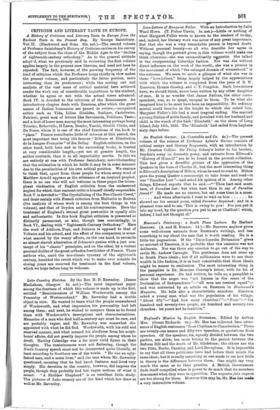CRITICISM AND LITERARY TASTE IN EUROPE.
A History of Criticism and Literary Taste in Europe from the Earliest Texts to the Present Day. By George Saintsbury. Vol. II. (Black-wood and Sons. 20s. net.)—The second volume of Professor Saintsbury's History of Criticism carries on his survey of the subject from the close of the Middle Ages to the "decline of eighteenth-century orthodoxy." As to the general attitude adopt^d, what we previously said in reviewing the first volume applies largely in the present case likewise, and need not here be repeated. The fact, however, of the growing frequency of the kind of criticism which the Professor keeps chiefly in view makes the present volume, and particularly the latter portion, more interesting than its predecessor; while the sorting out and analysis of the vast mass of critical material here achieved render the work one of considerable importance to the student, whether he agree or not with the actual views advanced. Book IV. is devoted to the criticism of the Renaissance. An introductory chapter deals with Erasmus, After which the great names of Italian humanism are passed in review,—recognised critics such as Vida, Lilius Giraldas, Scaliger, Castelvetro, Patrizzi; great men of letters like Savonarola, Poliziano, Tasso ; and a host of lesser men, among the most interesting perhaps being Trissino, Robortello, fl Lasca, Bembo, Varchi, Giraldi Cintio, and De Nores, whom it is one of the chief functions of the book to "plate." France contributes little of interest at this period, the most important text being the famous "Defense et Illustration de la Longue Francaise " of Du Bellay. English criticism, on the other hand, both here and in the succeeding books, is treated at very considerable length,—yet not at greater length, the author contends, than it in all impartiality merits. In this we are entirely at one with Professor Saintsbury, notwithstanding that the estimation in which he holds it may be in some measure due to the peculiarities of his own critical position. We venture to think that, apart from those people for whom every word of Matthew Arnold appears as the utterance of an inspired prophet, there is no one who will not welcome in these pages the trium- phant vindication of English criticism from the undeserved neglect for which that eminent critic is himself chiefly responsible. Book V. is devoted to "The Crystallizing of the Neo-Classic Creed," and deals mainly with French criticism from Malherbe to Boileau (the analysis of whose work is among the best things in the volume), and that of Dryden and his contemporaries. Here the treatment of England's second great poet-critic is equally able and enthusiastic. In this book English criticism is presented as distinctly paramount, as also, though less convincingly, in Book VI., dealing with " Eighteenth-Century Orthodoxy." Here the work of Addison, Pope, and Johnson is opposed to that of Voltaire and his school, and the effect of the comparison is some- what marred by the weary efforts, on the one hand, to reconcile an almost slavish admiration of Johnson's genius with a just con- tempt of his " classic " principles, and on the other, by a violent personal dislike of the great orthodox freethinker of France. Those authors who, amid the neo-classic tyranny of the eighteenth century, heralded the revolt which was to make ever notable its closing years are reserved for treatment in the final volume, which we hope before long to welcome.


























































 Previous page
Previous page